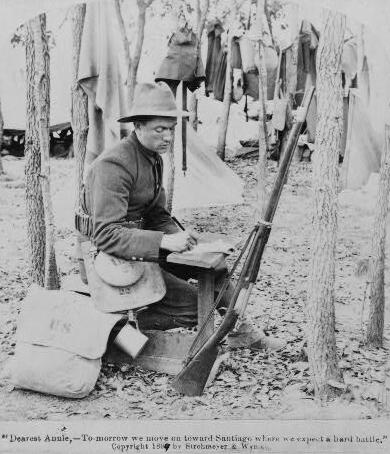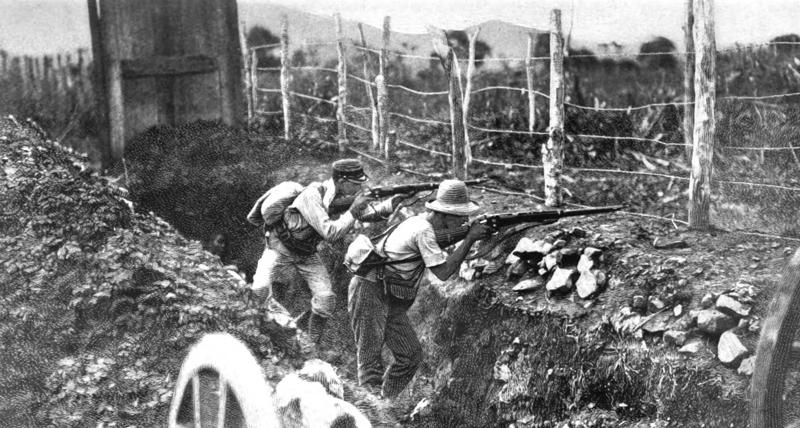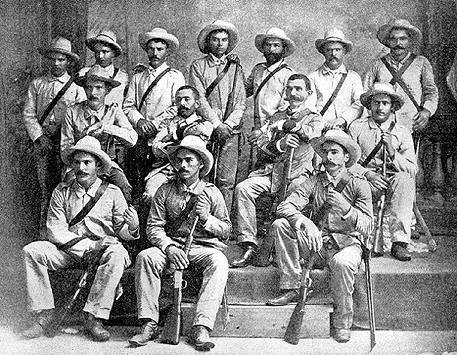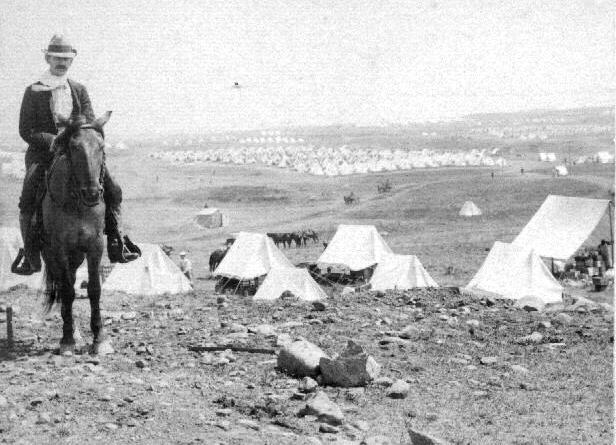![]() 1st Battalion 22nd Infantry
1st Battalion 22nd Infantry ![]()
Regimental History 1898 Part Two

From a period stereoview a US Soldier
writes a letter home.
"Dearest Annie, -- To-morrow we move on toward Santiago
where we expect a hard battle."
The march toward Santiago was resumed at 3:30
A. M., July 2.
At noon the regiment was placed in position and entrenched on the
extreme right of the line.
The morning's march was under desultory fire, but fortunately
only one man was wounded.
Most of this fire came from bullets aimed so high as to clear our
entrenchments and strike far beyond,
or from sharpshooters effectively concealed in the trees.
The activity of the regiment in the battle of July 1 earned for
it congratulatory orders from high sources.
The following order was the first received:
GENERAL ORDERS '
HEADQUARTERS IST BRIG., 2ND DIVISION, 5TH ARMY CORPS.
In front of Santiago de Cuba, July 3, 1898.
The Brigadier General Commanding desires to congratulate the
officers and men of this command on the gallantry
and fortitude displayed by them in the investment and capture of
Caney on Friday, July first, inst.
Infantry attacks on fortified positions well defended are
recognized as the most difficult of military undertakings and are
rarely successful.
The defense was conducted with admirable skill behind an
elaborate system of blockhouses, entrenchments and loop holes.
Nevertheless after a stubborn and bloody combat of nearly eight
hours, the place was taken and its garrison practically
annihilated.
The exploit is the more notable that the affair was entered upon
and carried through by men most of whom had never been under
fire.
The high percentage of casualties shows the severity of the work;
14% of loss among officers and 8% of the enlisted forces.
This action, though relatively of minor importance, will take its
place as one of the conspicuous events in military history,
by reason of its success under conditions of great difficulty,
and all who contributed toward the achievement
have reason for present and future congratulations.
BY COMMAND OF BRIGADIER GENERAL LUDLOW: (Signed) W. H. KELL,
Captain, 22nd Infantry, Act. Asst. Adjt. General.

Spanish soldiers fire from their trench at El Caney
Photo from Munsey's Magazine Volume XX p. 21
A second order of congratulation was issued on
July 4, 1898, from General Shafter's 5th Army Corps Headquarters.
At 10:30, the night of the second of July, the Spaniards made a
determined attack on our lines with heavy fire from both
artillery and infantry.
The entire regiment was put in the trenches and after half an
hour of spirited fighting the attack was repulsed.
Casualties in the regiment: two men killed and two wounded.
The regiment remained in camp July 3. At about 9 o'clock heavy
firing to the south of Santiago was heard, continuing several
hours.
That a naval engagement was on was confirmed by repeated rumors.
The lines waited anxiously for news of the result.
At noon the enemy sent out a flag of truce and all firing was
suspended by order of General Shafter.
Disheartening rumors about the result of the naval engagement
began to spread along the line—
Cervera's fleet had broken out of Santiago harbor and destroyed
the American fleet. Rumor next destroyed Cervera's fleet.
Then false reports came thick and fast first in favor of the
Americans and next in favor of the enemy.
Finally the regiment heard the same kind of
good, American cheers that had gladdened its heart late on the
afternoon of July 1,
very faint at first, then taken up by regiment after regiment,
growing constantly louder until at last it reached the 22nd on
the extreme right—
a mighty cheer announcing the truth that the American fleet had
won. Man danced on the trenches; regimental bands blared forth
triumphant airs,
Santiago became alive with music and cheers and waving flags.
The regiment, throughout the investment of Santiago, had position
on the extreme right of the line, and as the line was extended
from time to time
the 22nd was moved out and compelled to construct new trenches.
July 4 it broke camp at 7 A. M.,
marched three miles and took position to the right closer to
Santiago.
July 5 to July 9, the regiment remained in camp, with outposts in
the trenches. On the 10th, the line was again extended to the
right and intrenched.
At 4:30 P. M. this day the truce was concluded, the Spaniards
opening fire and continuing until 7 P. M.
The regiment remained in the trenches during the night.
July 11 and 12, the regiment was moved to its final position.
This position was attained only after overcoming many
difficulties. The 22nd Infantry was now intrenched with full
battalion front
between two roads leading to the city. The second battalion was
behind the first with the Eighth Infantry as reserve.
In forwarding General Ludlow's report of the
position to the Adjutant General of the Fifth Corps,
Major General Lawton lauded the extension of the right of the
line as follows :
"General Ludlow has practically
executed the orders communicated to him to move forward,
extending his right to the northeast point of Santiago bay, thus
completely cutting off the Spaniards from communication in that
direction.
This movement has been executed during the night under the most
trying conditions of weather.
Neither of the other brigades succeeded in changing their lines
to the front right because of the terrific storm which was
experienced last night.
General Ludlow has displayed great energy and perseverance for
which I heartily commend him and request that it be given
consideration".

Spanish soldiers in Cuba.
They are cavalrymen, or possibly irregulars, being equipped with
sabers
and Spanish made rolling block carbines.
In the final position the regiment's trenches were one hundred
and sixty yards from the trenches of the enemy.
During this period of investment the men worked at times day and
night in the trenches, often in heavy rains,
often under and returning fire—always on scant rations.
The Cuban force to the right, supposedly completing the
investment, withdrew from its position, leaving a gap
between the regiment and the bay, and rendering increased
vigilance necessary.
July 13 the regiment remained in camp.
July 14, from 11:30 A. M. to 3 p. M., the regiment occupied the
trenches pending the informal surrender of Santiago.
July 15 and 16 the regiment again remained in camp.
At 8:45 A. M., July 17, the regiment was formed in the trenches,
and, midway between the representatives of the two armies the
city,
surrounding provinces and 24,000 troops were formally
surrendered.
At noon the American flag was raised over the governor's palace,
the regiment during this ceremony parading in front of the
trenches.
Immediately afterward the following message from the President of
the United States was published in each regiment:
WASHINGTON, July 16, 1898. GENERAL SHAFTER:
The President of the United States sends you and your brave army
the profound thanks of the American people
for the gallant achievement at Santiago, resulting in the
surrender of the city and all of the Spanish troops and territory
under General Toral.
Your splendid command has endured, not only hardships and
sacrifices incident to campaign and battle,
but in stress of heat and weather has triumphed over obstacles
which would have overcome men less brave and determined.
One and all have displayed the most conspicuous gallantry and
earned the gratitude of the nation.
The heart of the people turns with tender sympathy to the sick
and wounded.
May the Father of Mercy protect and comfort them.
(Signed) WILLIAM McKiNLEY.
The following day, July 18, the regiment was
moved back-to the hills. It had suffered greatly from unavoidable
exposure.
Great discomfort, sickness and suffering prevailed. During the
almost daily rains, the men had been able to get only the slight
protection
afforded by shelter halves; frequently it had been necessary to
bivouac without even these.
For days and nights they had worn the same wet clothing and had
slept on wet ground. Malaria and dysentery had spread
until only a few officers and men were available for duty, and
even these kept their feet only because they were less sick than
the others.
The only bright spot in this period of depression came from the
activities of 'Captain J. T. Clarke, assistant Surgeon., U. S.
A.,
and E. H. Fitzgerald, Regimental Chaplain. Though sick and
suffering themselves, these two men were unceasing in their
cheering efforts
to lighten the burden of officers and men.
On July 19, General Shafter issued an order commending the
American troops for their success in Cuba
and particularly in the investment and capture of Santiago. This
order set forth in detail the difficulties of the operations,
citing the obstacles encountered in the tropical undergrowth and
terrain of the island.
August 11, orders came to return to the United States. The
command was inspected for yellow fever cases or suspects,
and infected clothing was burned. All that was left of the
regiment embarked on the Mobile August 12, and sailed for home at
1:30 P. M., August 13.
The departure of Ludlow's brigade involved the dissolution of the
2nd Division of the 5th Army Corps.
Its gallant commander, Major-General Lawton, paid it a parting
tribute in an order describing in detail the operations of the
corps
on Cuban soil and expressing his appreciation of the gallant and
soldierly manner in which the duties and labors required had been
performed.
The regiment's already long list of hardships was added to on the
return journey to the United States.
No provision had been made for the sick; men suffering from
fever, chills and various intestinal disorders were compelled to
eat the ordinary ration.
On the voyage the brigade lost eleven men. August 20, the Mobile
reached Montauk.

A view of Camp Wikoff, Montauk, N.Y. 1898
August 21, the regiment went into camp at Camp
Wikoff, so named in honor of the regiment's colonel
who had been killed in front of Santiago.
Here suffering was turned into surfeit. Nothing was left undone
by the government and private citizens
that could add to the comfort of the returned soldiers.
September 16, the regiment left Camp Wikoff for its former
station, Fort Crook, Nebraska.
September 18, Lieut. W. L. Taylor died in New York city of
malarial fever contracted during the campaign.
Lieut. Taylor was one of the most active officers on the battle
front in Cuba and had been commended during the fighting
for his bravery and coolness under fire as follows:
NORTH OF SANTIAGO, CUBA, July 19, 1898.
THE ASSISTANT ADJUTANT GENERAL,, 1st Brigade, 2nd Division, 5th
A. C., (Through intermediate commanders.)
SIR:
Having succeeded Captain Lockwood in command of the 2nd
battalion, 22nd Infantry, and not knowing whether or not,
on account of his sickness, he was able to make a report of the
fight at El Caney, I take this opportunity to recommend to your
consideration
1st Lieut. W. L. Taylor, who was as cool and collected as if on
target practice, kept his company under perfect fire discipline
and super-vised personally the direction of fire and the
adjustment of sights.
Very respectfully, your obedient servant, ROBERT N. GETTY,
Captain 22nd Infantry, Commanding 2nd Battalion, 22nd Infantry.
The regiment arrived at Fort Crook September
19. Of the twenty-nine officers and four hundred and eighty-four
enlisted men
that had left the post five months before, only five officers and
one hundred and sixty men returned.
Of the remainder, many were dead and many were still too sick for
duty.
Of those that returned almost all were still suffering from
hardships suffered on Cuban soil.
October 12, the regiment acted as escort to President Mc-Kinley
at the Trans-Mississippi exposition at Omaha, Nebraska.
As authorized by Congress April 26, 1898, Companies I, K, L, and
M, were organized,
the two former having been out of existence since July 21, 1890,
the latter as new organizations.
**********************
The 22nd Infantry sustained the
following casualties during the War with Spain:
Staff:
KILLED IN ACTION:
Colonel Charles A. Wikoff - July 1, 1898
WOUNDED IN ACTION:
Lieutenant Colonel John H. Patterson - July 1, 1898
Company A
KILLED IN ACTION:
Private Samuel Bennett - July 1, 1898
WOUNDED IN ACTION:
Captain George J. Godfrey - July 1, 1898
Corporal Laurence Graebing - July 1, 1898
Private Robert W.F. Ellingham - July 1, 1898
Private Henry Pohl - July 1, 1898
Private Charles A. Pound - July 1, 1898
Private William Mendel - July 1, 1898
Private Michael Sheehy - July 1, 1898
Private Gottfried Wruck - July 1, 1898
Sergeant Peter H. Dalin - July 2, 1898
DIED OF DISEASE:
Private Henry Niesen - August 11, 1898
Private Richard A. Walsh - August 19, 1898
Company B
KILLED IN ACTION:
Private Michael Werner - July 1, 1898
Private Michael Gibney - July 1, 1898
WOUNDED IN ACTION:
Captain John J. Crittenden - July 1, 1898
Corporal Hannan E. Newman - July 1, 1898
Musician David Olson - July 1, 1898
Wagoner Frank Kohlert - July 1, 1898
Private John H. Grotness - July 1, 1898
Private Joseph Schmitt - July 1, 1898
Company C
KILLED IN ACTION:
Private James Bampton - July 1, 1898
WOUNDED IN ACTION:
Sergeant Henry Janz - July 1, 1898
Private John C.F. Hill - July 1, 1898
Private John Sweeney - July 2, 1898
DIED OF DISEASE:
Private George W. Strother - July 10, 1898
Private William Ekstrand - July 24, 1898
Private William H. Corwin - August 4, 1898
Corporal James P. Kereven - August 31, 1898
Private Walter Sawyer - September 13, 1898
Company D
WOUNDED IN ACTION:
2nd Lieutenant William H. Wassell - July 1, 1898
Private James Connaghan - July 1, 1898
Private George Hoover - July 1, 1898
Private George W. Farlow - July 2, 1898
DIED OF DISEASE:
1st Lieutenant W. L. Taylor - September 18, 1898
Private John J. Louis - August 23, 1898
Company E
KILLED IN ACTION:
Private Gustav V. Sutter - July 1, 1898
WOUNDED IN ACTION:
Captain Frank B. Jones - July 1, 1898
Private Lyndall C. Jamison - July 1, 1898
Private George Winters - July 1, 1898
Private Frank W. Nelson - July 1, 1898
DIED OF DISEASE:
Corporal John Reddington - August 10, 1898
Private Albert H. Leek - August 11, 1898
Private Louis W. Hetzel - September 5, 1898
Company F
KILLED IN ACTION:
Private Martin T. Murray - July 2, 1898
Private Fred W. Lynch - July 12, 1898 - Died of Wounds
WOUNDED IN ACTION:
Captain Theodore Mosher - July 1, 1898
Sergeant William Parnell - July 1, 1898
Private Albert Field - July 1, 1898
Private Fred W. Lynch - July 1, 1898
Private Alet B. Strock - July 1, 1898
DIED OF DISEASE:
Private Charles F. Harrison - August 1, 1898
Sergeant Louis K.Wille - August 21, 1898
Private Herman Benjamin - August 25, 1898
Corporal Francis H. Sweet - August 30, 1898
Private Luke O'Connor - September 14, 1898
Private James Egan - September 21, 1898
Company G
KILLED IN ACTION:
Corporal Gebhard Young - July 1, 1898
Private Willie Brooks - July 1, 1898 - DIed of Wounds
WOUNDED IN ACTION:
Sergeant John B. Senecal - July 1, 1898
Corporal Christian P. Nielsen - July 1, 1898
Wagoner Fred Miller - July 1, 1898
Private Elmer E. Sedam - July 1, 1898
Private Casper Meither - July 1, 1898
Private Charles A. Osgood - July 1, 1898
Private Delbert E. Hartzell - July 1, 1898
DIED OF DISEASE:
Private William Kalloch - August 8, 1898
Private William O. Meyers - September 5, 1898 ²
Company H
KILLED IN ACTION:
Private William L. Forrester - July 1, 1898
Private Peter Johnson - July 1, 1898
Private Ernest A. Schetzel - July 2, 1898
WOUNDED IN ACTION:
Private Michael A. Donohoe - July 1, 1898
Private James Harris - July 1, 1898
Private Leonard Kupper - July 1, 1898
Private Richard Shepard - July 1, 1898
DIED OF DISEASE:
Private Lorenzo B. Ferris - August 15, 1898
**********************
During the year 1898 the
following Officer promotions and appointments were made
in the 22nd Infantry:
COLONEL
Harry C. Egbert ..... 1 July 1898
LIEUTENANT COLONEL
Henry H. Humphreys ..... 23 December 1898
MAJOR
Leopold O. Parker ..... 26 April 1898
Charles G. Penney ..... 15 August 1898
CAPTAIN
Edward O.C. Ord ..... 26 April 1898
Henry C. Hodges, Jr. ..... 26 April 1898
Jacob F. Kreps ..... 3 July 1898
Alfred S. Frost ..... 14 December 1898
FIRST LIEUTENANT
Peter W. Davidson ..... 26 April 1898
Orrin R. Wolfe ..... 26 April 1898
Hanson E. Ely ..... 26 April 1898
Albert C. Dalton ..... 26 April 1898
William H. Wassell ..... 26 April 1898
David S. Stanley ..... 23 July 1898
Isaac Newell ..... 21 September 1898
SECOND LIEUTENANT
David L. Stone ..... 26 April 1898
Ivers W. Leonard ..... 9 July 1898
Robert R. Nevin ..... 9 July 1898
Harry R. Campbell ..... 9 July 1898
Ralph B. Parrot ..... 9 July 1898
Charles N. Murphy ..... 9 September 1898
George E. Thorne ..... 9 September 1898
Charles E. Morton ..... 10 October 1898
**********************
Much of the above narrative taken from the 1904 and 1922 Regimental Histories
Additional information taken from:
Returns from Regular Army Infantry
Regiments, June 1821–December 1916. NARA
microfilm publication M665
National Archives and Records Administration, Washington, D.C.
Home | Photos | Battles & History | Current |
Rosters & Reports | Medal of Honor | Killed
in Action |
Personnel Locator | Commanders | Station
List | Campaigns |
Honors | Insignia & Memorabilia | 4-42
Artillery | Taps |
What's New | Editorial | Links |